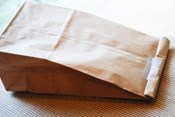You thought it was a bright idea, popping popcorn in a paper bag in the microwave oven. Then the bag caught fire and destroyed half the countertop and refrigerator before it was extinguished, said Drusilla Banks, a University of Illinois Extension nutrition and wellness educator.
“Or how about the time you decided to use a garbage can for a barbeque grill? You were all coughing and choking from the toxic fumes that thing emitted,” said Banks.
When you think about kitchen safety, choosing food safe containers may not come to mind, but it should. Just because a container looks suitable for cooking or food storage doesn’t always mean it is safe for you and your family, she said.
Take, for instance, brown paper bags—according to the FDA, the ink, glue, and recycled materials in brown paper bags may emit toxic fumes when the bag is heated. Also, paper bags ignite easily during heating, she said.
“Brown paper bags are generally made of recycled materials these days. The bags must carry a recycle statement and symbol. They are not safe cooking containers,” she added.
Metal trash cans are another good example of a container that is often misused. These cans are made of galvanized metal. Galvanization is a process used to prevent rusting. During this process, a protective zinc-based chemical coating is applied to containers such as metal trash cans, buckets, flower pots, etc. These containers were not designed to hold edibles and may leach harmful chemicals into foods and beverages.
Non-food–grade containers are unsafe too
As a general rule, if the container once held non-food items, it should not be recycled into a food storage container. These containers were not designed to hold foods and may leach unsafe substances into foods, Banks said.
“To name a few of these unsafe food containers, there are empty plastic paint buckets, film canisters, trash bags, and oil drip pans,” she said.
Paint brushes, hair brushes, and shaving brushes should not be used for slathering sauce on barbeque or basting a turkey. These products were not manufactured under sanitary conditions and may contain unsafe materials because they were never intended for food, she said.
“In this age of recycling, many people want to re-use items that were intended for a single use. Disposable plastic forks, spoons, knives, and cups are porous and do not stand up well to repeated cleaning and hot soapy water. Cups may have edges that curl over and collect bacteria that cannot be cleaned out. These items should not be reused; they should be sent to your local recycling facility,” Banks added.







